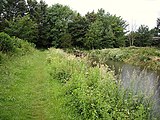Purpose
Since the 1960s, the Lancaster Canal Trust and the Inland Waterways Association recognised the value of preserving inland waterways. Both groups lobbied for the restoration of this northern stretch of canal to navigable standard. In the 1990s the NRRG was specifically formed to continue the campaign for the waterway's restoration.
These aims include increasing awareness and promoting interest amongst local communities and all potential users (boaters, walkers, cyclists, and anglers) of the historic waterway.
The NRRG is also committed to maintaining the surviving canal infrastructure found along the route of the Northern Reaches. As a result of its efforts, many of the original structures have been protected, further loss to cruising waterway has halted, and improvements have been made to the towpath by erecting interpretative panels at various sites along the disused canal.

Lancashire is a non-metropolitan and ceremonial county in North West England. The county's administrative centre is Preston, while Lancaster is the county town. The present borders of the administrative county were created by the Local Government Act 1972 and enclose a population of 1,449,300 and an area of 1,189 square miles (3,080 km2).
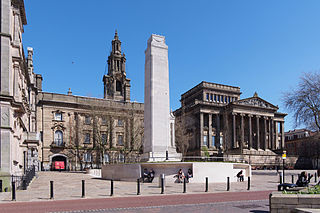
Preston is a city on the north bank of the River Ribble in Lancashire, England. The city is the administrative centre of the county of Lancashire and the wider City of Preston local government district. Preston and it's surrounding district obtained city status in 2002, becoming England's 50th city in the 50th year of Queen Elizabeth II's reign. Preston has a population of 114,300, the City of Preston district 132,000 and the Preston Built-up Area 313,322. The Preston Travel To Work Area, in 2011, had a population of 420,661, compared with 354,000 in the previous census.

The Lancaster Canal is a canal in North West England, originally planned to run from Westhoughton in Lancashire to Kendal in south Cumbria. The section around the crossing of the River Ribble was never completed, and much of the southern end leased to the Leeds and Liverpool Canal, of which it is now generally considered part.

Kendal, once Kirkby in Kendal or Kirkby Kendal, is a market town and civil parish in the South Lakeland district of Cumbria, England, 8 miles (13 km) south-east of Windermere and 19 miles (31 km) north of Lancaster. Historically in Westmorland, it lies within the dale of the River Kent, from which its name is derived. At the 2011 Census, the town had a population of 28,586, making it the third largest town in Cumbria after Carlisle and Barrow-in-Furness. It is renowned today mainly as a centre for shopping, for its festivals and historic sights, including Kendal Castle, and as the home of Kendal Mint Cake. The town's grey limestone buildings have earned it the sobriquet "Auld Grey Town".
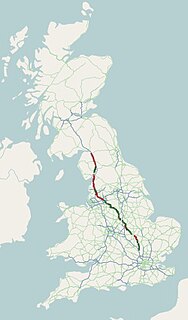
The A6 is one of the main historic north–south roads in England. It runs from Luton in Bedfordshire to Carlisle in Cumbria, although it formerly started at a junction with the A1 at Barnet. It is the fourth longest numbered road in Britain; only the A1, A38 and A30 are longer.

The River Ribble runs through North Yorkshire and Lancashire in Northern England. It starts close to the Ribblehead Viaduct in North Yorkshire, and is one of the few that start in the Yorkshire Dales and flow westwards towards the Irish Sea.

Lancashire is a county of England, in the northwest of the country. The county did not exist in 1086, for the Domesday Book, and was apparently first created in 1182, making it one of the youngest of the traditional counties.

The Inland Waterways Association (IWA) is a registered charity in the United Kingdom and was formed in 1946 to campaign for the conservation, use, maintenance, restoration and sensitive development of British Canals and river navigations.

The Millennium Ribble Link is a linear water park and new navigation which links the once-isolated Lancaster Canal in Lancashire, England to the River Ribble. It was opened in July 2002.
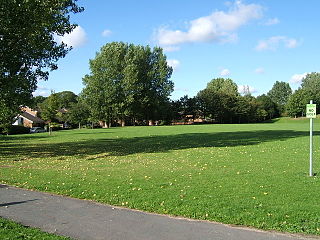
Clayton Brook is a large residential estate in Lancashire, between the city of Preston and the town of Chorley. It forms part of the Clayton-le-Woods civil parish, and is in the Clayton-le-Woods North ward of the borough of Chorley. Lying next to the industrial estate of Walton Summit, one-time terminus of a branch of the Lancaster Canal, it also neighbours Clayton Green, Hoghton and Brindle, and is not far from the small town of Bamber Bridge. Clayton Brook Village as it is often termed, is bounded by the A6 road and the M61 and M65 motorways, and is conveniently near the M6 motorway.
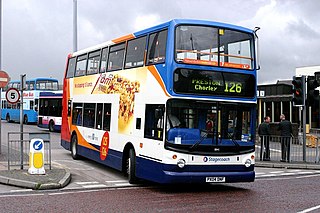
Stagecoach North West was a major operator of bus services in North West England. It was a subsidiary of the Stagecoach Group, and had its origins in the purchase of Cumberland in 1987 and Ribble Motor Services in 1988 from the National Bus Company. The head office of Stagecoach North West was in Carlisle. Although the cities of Liverpool and Manchester are in the North West of England, Stagecoach Manchester and Stagecoach Merseyside were run as separate divisions.

Holme is a village and civil parish in the South Lakeland district of Cumbria, England, about 2 miles (3.2 km) north of Burton-in-Kendal and 3 miles (4.8 km) south east of Milnthorpe. The parish had a population of 1,167 at the 2001 census, increasing to 1,486 at the 2011 Census.
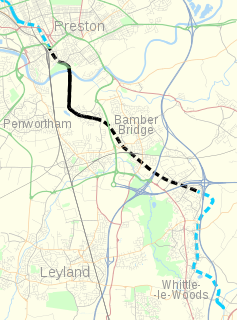
The Lancaster Canal Tramroad, also known as the Walton Summit Tramway or the Old Tram Road, was a plateway, completed in 1803, to link the north and south ends of the Lancaster Canal across the Ribble valley, pending completion of the canal. The canal link was never constructed.

The Lancaster Canal Trust is a waterway society and a registered charity on the Lancaster Canal in Lancashire and Cumbria, England.

Tewitfield is a hamlet in Lancashire, England, near Borwick and Carnforth, and in the parish of Priest Hutton.
The Ribble Link Trust is a waterway society, campaigners, instigators of and involved in the Ribble Link, a navigable waterway that connects the Lancaster Canal to the Leeds and Liverpool Canal in Lancashire, England, via the River Ribble.

The Lune Aqueduct is a navigable aqueduct that carries the Lancaster Canal over the River Lune, on the east side of the city of Lancaster in Lancashire, England. It was completed in 1797 at a total cost of £48,320 18s 10d. It is a Grade I listed building.
Walton Summit is an industrial area between Clayton Brook and Bamber Bridge, near Preston in Lancashire, England. It is in the South Ribble district. It is near the M61, M65 and M6 motorways and has a bit of single carriageway motorway from the M65/M61 roundabout. Walton Summit also includes the smaller area of Seed Lee.

Stagecoach Cumbria & North Lancashire is a major operator of bus services in North West England. It is a subsidiary of the Stagecoach Group, and has its origins in the purchase of Cumberland in 1987 and Ribble in 1988 from the National Bus Company. The head office of Stagecoach Cumbria & North Lancashire is in Carlisle. It was previously known as Stagecoach North West until 1 September 2011, when Stagecoach Merseyside joined Preston and Chorley depots to form Stagecoach Merseyside & South Lancashire.


